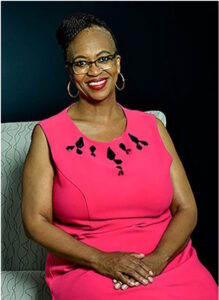Dr Simon Ball, H890 Conference Organiser and Associate Lecturer, IET

Background
The inaugural H890 Online Conference took place on April 12th 2024, as part of the Open University module ‘H890: Research And Scholarship In Digital Education’. This module is a postgraduate, 60-credit module that forms part of the Masters in Online Teaching. Each year the module students work on a scholarship project or design a larger research project, on a theme of their own choice and relevant to their own professional context. They then present progress and findings at the online conference, which is open to the general public and to which all students of IET’s modules and micro-credentials are invited, along with OU staff.
Keynote Presentation

We were delighted that Professor Mpine Makoe of the University of South Africa agreed to deliver our keynote presentation, opening the conference. Professor Makoe is an Open University Masters graduate herself, and since graduating in 2007 has gone on to become a globally recognised name in the field of Open and Distance Learning. She is the Executive Dean of the College of Education and the Commonwealth of Learning Chair in Open Education Practices/ Resources (OEP/OER) (2018-2022) at the University of South Africa (UNISA). She is a National Research Foundation (NRF) rated research professor in Open Distance eLearning (ODeL) and an OER ambassador for the International Council for Distance Education (ICDE). She is a UNESCO higher education expert working on the Futures for Higher Education 2050, a member of the University of the Futures Network. She has also facilitated the development of ODL policies in different universities in Africa as a consultant for the Commonwealth of Learning.
Professor Makoe delivered her keynote presentation on the theme of “Shaping the Futures of Digital Scholarship”. She described a key process for those working in higher education to Rethink (the mission of higher education in the digital era), Redefine (higher education’s response to society’s changing needs) and Repurpose (solutions to become workable in a highly digitalised world). She also highlighted the role of senior managers like herself in creating a landscape in which digital education can become optimally effective, saying “Aspirations of the futures of higher education are dependent on political will and enabling policy environments that will guide the strategies of digitalisation.”
Future research methodologies would also need to adapt to a rapidly changing landscape, Professor Makoe argued. Where mapping of research gaps would need always to take into account an ‘anticipation’ element, taking note of trends and emergent techniques and technologies in order to create a range of potential scenarios, to enable the research to become truly transformative.
The keynote presentation wrapped up with a consideration of our own educational futures – what could the community of 2050 look like? What type of political, social and economic activities could people be engaged in? What would digital education need to look like as a result? She propose that four general themes would become prominent in our digital education future: ecological sustainability, networked learning hubs (compared to isolated classrooms and establishments), developmentally driven change, and open education.
Student presentations
Following Professor Makoe’s thought-provoking and stimulating keynote presentation, it was the turn of our students to make their presentations. Nerves were high, but every one of them did themselves proud with high calibre presentations of some fascinating research and scholarship projects.
Brenda Little – Contributory Factors to Disengagement with eLearning in the NHS Workforce
Drawing the short straw of having to speak first, directly after the keynote, didn’t put Brenda off her stride. She reported on her investigation into why engagement with digital professional development activities was low in her work context, routinely coming up against comments like “I’m too old for this” or “I don’t do computers” or “I didn’t join the NHS to…”. Brenda has designed a study to investigate what precisely it is that turns a portion of people off eLearning, what factors enable their engagement with other types of technology, and how those enablers could be used to increase engagement with eLearning.
Tina Hedger – Online learning and children – critically exploring their lived experiences
Next up we heard from Tina, a science teacher and teacher trainer. Her research had found that most eLearning studies are conducted either in primary-level education or in post-compulsory education, with comparatively few studies focussing on her area of secondary education, and of those a large proportion focussing on contexts in the USA or Sweden. She didn’t recognise much overlap between the contexts described in the research and the one she was teaching in. Tina has designed a research study to interview home-schooled students and to use her knowledge of technology-enhanced learning to build an alternative model for secondary education that is not always situated in the one-location-only school scenario, which does not suit all students (3000 children lose a day’s education daily in the UK due to suspensions alone). She will allow the children to deliver their own narratives, and shape them into recommendations for reshaping the traditional narrative to create a model for the successful education of children who do not fit well into the traditional school systems.
Marilyn Long – Can digital pedagogy create real-world inclusion for autistic student outliers?
Before the break we heard from Marilyn, who is researching the educational experiences of autistic students for her doctorate from the OU. She starts from the perspective that education is mainly designed for the ‘ideal’ student, who, much like the ‘average’ person for whom mass-market clothes are designed, doesn’t actually exist. The concept of the ‘ideal student’ can in fact be damaging to those who perceive themselves to be different and to therefore not ‘meet expectations’. This can lead to emotional stress and feelings of being ‘an outsider’. Marilyn’s research is ongoing but aims to challenge perceptions, encouraging policymakers to rethink their approach to inclusion and to challenge bias, changing the focus of ‘reasonable adjustments’ such that students are more readily included by a suite of offerings and approaches to learning, and the focus shifts from the individual adapting to fit the modes of learning to adapting the modes of learning to be more widely inclusive.
Andy Eagle-Weston – Asynchronous online learning: facilitating management compliance in a UK university
After a short break, Andy got the second part of the conference underway by looking at the management side of education and the role of digital learning in aiding managers to become more ‘competent at managing people processes, aligned to the organisation’s behavioural framework’. His research questions included two main aspects: ‘How can learning design be used to motivate people managers to interact with learning content online? ‘ as well as ‘To what extent does the learning design of online asynchronous content encourage process and behavioural compliance?’. Following the implementation of some asynchronous online learning materials (‘toolkits’) the results of Andy’s survey showed that 90% of respondents ‘believe the design of online learning material to be important in motivating engagement and completion’ and yet over half of managers had not used them. Word was clearly not spreading. Andy has gathered his findings and shared them with the Organisational Development Team who are tasked with increasing the usage of the ‘toolkits’ that are so highly rated by those that have used them.
Nina Williams – ADHD and the VLE: Student Perspectives and Improvement Strategies
Next, Nina showcased her research proposal focussing on improving the student experience of individuals with ADHD. In addition to identifying and illuminating the challenges faced by students with ADHD, she will try to identify the most effective support strategies, that might then be more widely used. She will utilise digital diaries by the students themselves as well as a survey tool to gather data. Similarly to Marilyn’s research, the aim is to create a better fit for people who are different from the ‘average’ student. The areas that are most ripe for attention, according to Nina, are: Consistency (ensuring similar look and feel to materials withing the same course and between courses, clear and consistent layout, clear task instructions and smaller, more manageable ‘chunks’ of learning); Focus (providing a variety of experiences, issuing multiple reminders for activities, enabling self-regulation by the use of inbuilt tools); and Assessment and Feedback (reduction of stakes per assessment, creative approach to assignment design, peer assessment as preparation for negative feedback).
Ian Kirton – Investigation into the Digital Pedagogical Practices of Bucher Emhart Glass
Ian opened up the world of industry to the audience with his project set in the context of training in the glass production industry. In particular he investigated whether the didactic training methods common in eLearning in his context were the most effective method in achieving learning outcomes. Historically eLearning training materials were barely removed from the older face-to-face PowerPoint materials from which they descended. Ian designed a survey of staff members to ascertain what they wanted from their eLearning, and is in the process of combining this with a full evaluation of existing content (relevance, accuracy and depth of material), an investigation into the pedagogy that is currently employed in their eLearning training (including looking at learning engagement, comprehension and retention) and a wide-ranging assessment of the technological features (functionality, usability, accessibility) that may be supporting or hindering the learning process. Once the data is gathered, Ian will undertake a comparative analysis to compare student outcomes under the current system with those using alternative methods or platforms, and will then benchmark against industry standards and best practices in eLearning.
Ju Tope – Mini MOOC for Capstone IT project module
Tasked with rounding off the conference, Ju took us into the world of an OU module in computing, in which students have to come up with an idea for a project to undertake (and often struggle to do so). Her research had two strands – identifying what the learner needs in order to make an informed project choice, and what content educators think the students need in order to make a sound choice. Learners have been surveyed, educator focus groups held, other similar courses investigated, and pedagogical approaches considered. Now Ju is in the process of planning and designing a mini-MOOC after developing a framework for the intervention required. The mini-MOOC will use a constructivist approach although with a strong element of social learning, as this is what the data gathered indicated most likely to be able to deliver what the learners need.
Conclusion
As is evident from the breadth and depth of the student research and scholarship projects presented at the conference, H890 brings together not only highly capable students but those from vastly different working contexts. This helps to make the H890 conference a fascinating learning experience for all concerned. The student presenters were subsequently given the opportunity to vote for the most effective presentation among their peers, and as a result we were delighted to give both Brenda Little and Andy Eagle-Weston a Presentation Star Award certificate. We were delighted that our keynote speaker Professor Makoe remained in attendance for the full event and complimented all of our students presenters on the high standard of their work. Now, the students will focus on their EMA before taking flight to further their research and scholarship or to implement what they have learned in their work contexts. My role as Conference Organiser will be packed neatly away and put into temporary storage, ready to emerge for the next presentation of H890 which begins in October. Should you wish to attend next year’s event, please keep an eye on the conference website at https://www.open.ac.uk/blogs/H890Conference/ – registration (free, of course) usually opens in January. Please use the comments facility on each student’s abstract page within the conference website if you wish to communicate directly with any of the student presenters.